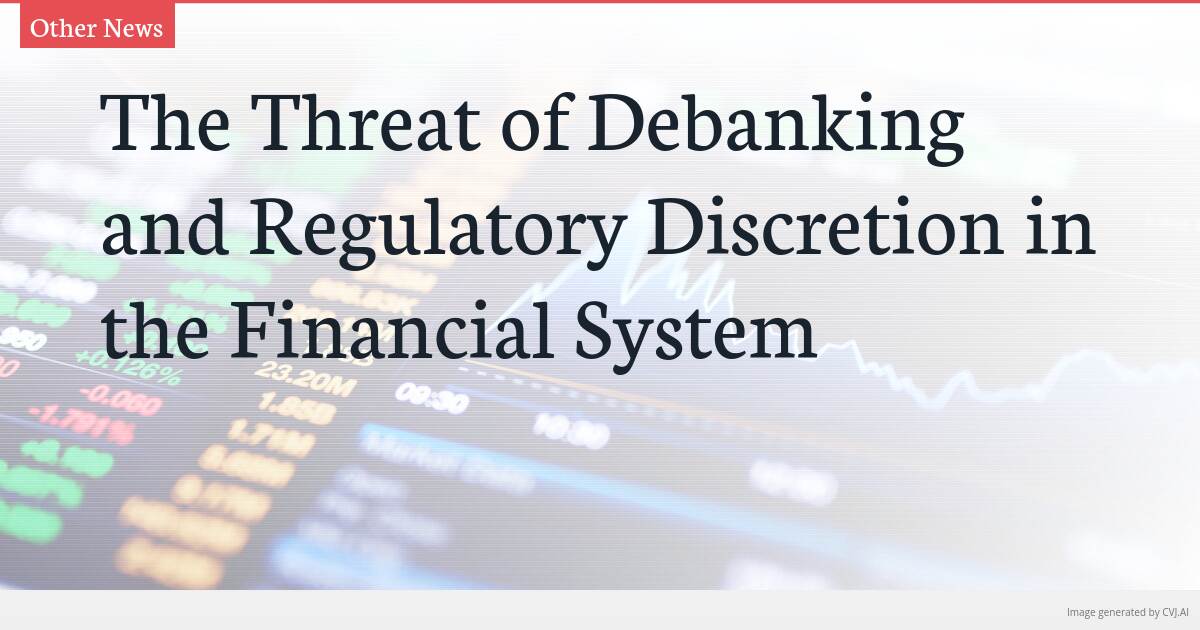This summary text is fully AI-generated and may therefore contain errors or be incomplete.
The ongoing challenge of debanking in the cryptocurrency sector has become a significant obstacle, reflecting a broader issue of regulatory discretion that jeopardizes the financial stability of compliant businesses. Operation Choke Point 2.0 has raised bipartisan concerns, emphasizing the vulnerable position of crypto-related companies within the banking system.
Regulatory Pressure and Debanking
Federal regulators have been pressuring banks to sever ties with customers involved in cryptocurrency. This has fostered an environment where debanking—closing accounts for political or reputational reasons—has become increasingly prevalent. It is important to note that this practice is not necessarily linked to illegal activities; rather, it arises from regulators indicating that banks will face scrutiny if they engage with certain customer types.
The consequences of this pressure are significant, effectively marginalizing a growing industry that has yet to fully integrate into the traditional financial system. As a result, many cryptocurrency firms are struggling to obtain essential banking services, which pushes them to the margins of the financial ecosystem.
Historical Context of Operation Choke Point
The origins of Operation Choke Point date back to its establishment in 2013, when federal regulators aimed to restrict banking access for industries considered undesirable, such as payday lenders and gun sellers. This initiative was marked by a deliberate effort to “choke off” banking services to specific sectors, raising serious concerns about the government’s role in regulating legal businesses.
Although the program faced considerable backlash, leading to its eventual dismantling, the regulatory framework that facilitated such actions remains largely intact. Documents released in 2020 revealed the involvement of high-ranking officials at the Federal Deposit Insurance Corporation in orchestrating the original initiative, highlighting how easily federal regulators can influence banking practices.
Discretion and Civil Liberties
The extensive discretion afforded to federal regulators poses a significant threat to civil liberties and the financial rights of individuals and businesses. There are virtually no limitations on regulators’ ability to de-bank law-abiding citizens and businesses without due process. This creates an environment where mere association with certain industries can lead to financial exclusion, raising concerns about the potential for abuse.
Moreover, the regulatory landscape is further complicated by laws that require banks to collect extensive personal information on their customers. While these regulations aim to combat money laundering and other financial crimes, they also provide regulators with a rationale to pressure banks into cutting ties with customers involved in industries perceived as high-risk.
Implications for Other Industries
The implications of this regulatory environment extend beyond the cryptocurrency sector. There are already calls for similar measures against industries like oil and gas in the name of climate change. The potential for regulators to leverage their authority to exclude entire sectors raises critical questions about the future of financial stability and the government’s role in shaping market dynamics.
As discussions surrounding Operation Choke Point 2.0 continue, it is evident that bipartisan solutions are necessary to address the fundamental issues of regulatory discretion. Both political parties must collaborate to limit the powers granted to regulatory agencies, ensuring that businesses can operate without the threat of arbitrary debanking.
The Future of Cryptocurrency
In this evolving landscape, the cryptocurrency industry stands at a crossroads, facing both challenges and opportunities as it seeks to integrate into the broader financial ecosystem. The outcome of this struggle will not only influence the future of cryptocurrency but also establish important precedents for the relationship between government regulation and the rights of businesses in a rapidly changing economic environment.
As the industry navigates these challenges, it is crucial for stakeholders to advocate for a regulatory framework that supports innovation while protecting the rights of businesses. The balance between regulation and freedom will ultimately determine the trajectory of the cryptocurrency sector and its role in the global economy.
📎 Read the original article on forbes.com


